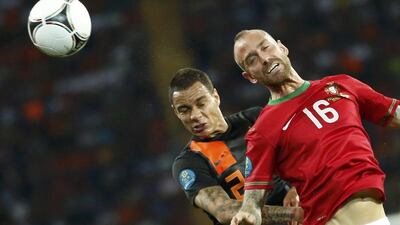Netherlands coach Louis van Gaal on Tuesday unveiled his provisional 30-man World Cup squad, with Paris Saint-Germain right-back Gregory Van der Wiel a notable absentee.
Van Gaal has decided against taking a risk with a player who has been suffering with tendinitis in recent weeks.
The absence of the 26-year-old means only eight members of the 30-man squad featured at the 2010 World Cup in South Africa, when the Netherlands lost to Spain in the final.
Goalkeeper Maarten Stekelenburg and defenders John Heitinga and Joris Mathijsen are also missing but Wesley Sneijder is there, despite Van Gaal recently expressing doubts as to the condition of the Galatasaray playmaker.
Seven of the 30-man list come from Dutch championship runners-up Feyenoord.
The Netherlands will come up against reigning world champions Spain, Chile and Australia in Group B in Brazil and will face Spain in their opening game in Salvador on June 13.
Provisional Netherlands World Cup squad
Goalkeepers: Jasper Cillessen (Ajax), Tim Krul (Newcastle United), Michel Vorm (Swansea City), Jeroen Zoet (PSV Eindhoven)
Defenders: Patrick van Aanholt (Vitesse Arnhem), Daley Blind (Ajax), Daryl Janmaat, Terence Kongolo, Bruno Martins Indi (all Feyenoord), Karim Rekik (PSV Eindhoven), Joël Veltman (Ajax), Paul Verhaegh (Augsburg), Ron Vlaar (Aston Villa), Stefan De Vrij (Feyenoord).
Midfielders: Jordy Clasie (Feyenoord), Leroy Fer (Norwich City), Jonathan De Guzman (Swansea City), Nigel de Jong (AC Milan), Wesley Sneijder (Galatasaray), Tonny Vilhena (Feyenoord), Rafael van der Vaart (Hamburg), Georginio Wijnaldum (PSV Eindhoven).
Forwards: Jean-Paul Boëtius (Feyenoord), Memphis Depay (PSV Eindhoven), Klaas-Jan Huntelaar (Schalke), Dirk Kuijt (Fenerbahçe), Jeremain Lens (Dynamo Kiev), Robin van Persie (Manchester United), Arjen Robben (Bayern Munich), Quincy Promes (Twente).
Follow us on Twitter @SprtNationalUAE

